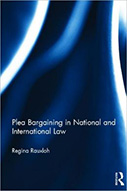Plea Bargaining in National and International Law
 Author: Regina Rauxloh
Author: Regina Rauxloh
Publisher: Routledge, London, 2012. Pp. 285
Reviewer: Yue Ma | May 2014
In this well written book, Regina Rauxloh explores the emergence and characteristics of plea bargaining in different criminal justice systems. The book contains four case studies. Three are on plea bargaining or the lack of it in individual countries, and one on plea bargaining in the context of seeking international criminal justice. Rauxloh discusses the rise and the current status of plea bargaining in England and Germany. She then explores the reasons for the lack of plea bargaining in the former Democratic Republic of Germany under the socialist legal system. The highlight of the book is the author’s exploration of the development of plea bargaining in international criminal tribunals.
In the chapter on England and Wales, Rauxloh traces the development of plea bargaining and takes note of the somewhat unique fashion in which plea bargaining took hold in the English system. In the late 1970s, when it became known that plea bargaining had developed into a widespread practice, the Court of Appeal ruled repeatedly against the practice. The lower courts, however, disregarded the express disapproval of the Court of Appeal. The higher court, despite its desire to preserve the tradition of disposing of criminal cases through trial, eventually submitted to the widespread practice of plea bargaining. Rauxloh considers it a fundamental fault that plea bargaining took hold in England despite an express ruling to the contrary by the Court of Appeal. This assessment is fully justified, for one would expect that in the oldest common law country the lower courts would faithfully follow the higher court’s decisions. The modern lesson in this regard seems to be that even in England, where the common law tradition originated, the practical concern over efficient handling of cases tends to prevail over the desire to uphold the cherished tradition.
Rauxloh calls into question various justifications advanced for plea bargaining. She points out that there is no empirical evidence to support the justifications such as reward of remorse, cost efficiency, and advantages for the defendant and the victim. She observes that despite the lack of empirical support for the practice, when all courtroom actors, from defense lawyers to judges and prosecutors, stand to benefit from the practice, the triumph of plea bargaining is inevitable. The author is critical of plea bargaining as practiced in England and argues that the practice has adversely impacted the fair administration of justice. Plea bargaining has encouraged prosecutorial overreach and led to serious erosion of criminal defendants’ procedural rights. She disputes the proposition that innocent defendants are not put in danger of being wrongly convicted because only factually guilty people can feel remorse. She points to several research studies sponsored by the government, which find that innocent defendants could be pressured or induced into pleading guilty. She also registers strong disapproval of the government’s position that the risk of innocent defendants pleading guilty is a risk worth taking because of the benefits to plea bargaining.
In the chapter on Germany, Rauxloh explores the secret beginning of plea bargaining in that country. In the 1970s, as plea bargaining became a widespread practice in countries such as the United States, the German system in the eyes of scholars critical of plea bargaining was an envious model that demonstrated that the modern criminal justice system was able to work without plea bargaining. Rauxloh shows, however, that Germany was by no means such a model. Her research shows that the practice of informal settlements gained popularity in West Germany at about the same time as it did in the United States. Germany was seen as a model merely because the practice was well concealed from public and academic discourse. The reason for keeping the practice secret was simple: the courts and practitioners were acutely aware of the illegal nature of the practice. It could not be reconciled with the principle of legality to which Germany had faithfully adhered for so long.
Rauxloh notes that in spite of the substantial differences between the common law and civil law systems of criminal procedure, the practices of informal negotiations in England and Germany have features in common. The reason for the rise of informal settlements in Germany was not different from that in England. In Germany, informal settlements gained popularity first in cases involving economic crime, tax evasion, and environmental crime. In the 1970s, German lawmakers substantially expanded German criminal law by creating a large number of economic and environmental crimes. The expansion of criminal law inevitably brought about an increased caseload for the courts and the prosecution offices. Faced with the drastic increase in the number of cases, especially complicated cases involving economic and environmental crimes, the courts could no longer dispose of all the cases in the form of trial. Informal settlements became the solution. The practice was at first confined to cases involving economic crimes, but once accepted it soon spilled into other serious crime areas.
When the practice of informal settlements was finally brought to light, it was severely criticized by academics. Scholars described many values and norms of the German criminal process which could not be reconciled with the new practice. The German High Court, nonetheless, took a practical approach. Recognizing the difficulty for the courts to cope with the mass of cases without the help of out-of-court negotiations, the High Court was willing to accept the practice. Despite the long-standing principle of legality, the High Court ruled that the practice was not generally unconstitutional. To strike a balance between the traditional values of the German criminal process and the pragmatic necessity of informal agreements, the High Court on one hand permitted the practice, and on the other established a set of rules to regulate it. The rules laid down by the High Court included that all participants had to be involved, the negotiation and the content had to be exposed in the trial hearing, the defendant’s confession had to be investigated to determine whether it was genuine, and the content of the agreement had to be lawful and justifiable. The conditions set by the High Court still govern the practice of informal settlements in Germany.
Rauxloh points out both similarities and differences in bargaining justice as practiced in England and in Germany. In Germany, as in England, informal negotiations can be found at all stages of the proceedings, from the preliminary investigation to the end of trial. Different from the English practice, the German criminal procedure does not recognize a guilty plea and the confession has no trial avoiding effect. Except in minor cases in which the defendant is likely to be punished by only a fine, even when a defendant admits his guilt, the court must still examine whether there is sufficient evidence to support the confession. In countries such as the United States and England, the judge takes no part in plea negotiations. In Germany, in keeping with the central role of the presiding judge at trial, settlements can take place not only between the defense counsel and the prosecutor at the time of preliminary investigation, but also between prosecutor, defense lawyer and the presiding judge during the main proceedings.
Rauxloh also discusses the socialist legal system by using the former German Democratic Republic as an example, and explores why the practice of informal negotiations had not developed in East Germany. Drawing upon her extensive interviews with judges, prosecutors, and lawyers functioning in the then East Germany, she presents a vivid picture of the socialist legal system in action. With respect to plea bargaining, Rauxloh comments that plea bargaining must be understood within the framework of the system’s value system. The function of the East German criminal process was different from that of the Western criminal process. Rather than protecting the defendant against the overwhelming power of the state, the criminal process functioned to strengthen and develop citizens’ ideology and socialist morals. Because of the ideological mission of the criminal process, the government understandably would not allow the function of political education to be undermined by the practice of informal settlements. Furthermore, because defendants enjoyed no extensive rights, the system was able to handle all criminal cases at trial. There was no need for criminal justice actors to resort to the practice of informal settlements.
In a chapter on plea bargaining in international criminal tribunals, Rauxloh provides a fascinating inquiry about the issues surrounding plea bargaining in the context of seeking international criminal justice. Many feel that because of the gravity of the crimes in these jurisdictions it is inappropriate to conduct any negotiations with the alleged perpetrators. Based on her analysis of the bargaining practice in the International Criminal Tribunal of Former Yugoslavia and the International Criminal Tribunal of Rwanda, Rauxloh argues that there could be even more justifications for plea bargaining in disposing of international criminal cases than in the handling of domestic criminal cases.
The author identifies several disadvantages of disposing of criminal cases in the form of full trial by the international criminal court. First, the international criminal court is ill equipped to conduct effective investigations. In addition to difficulties such as the number of offenses, the number of victims, the number of offenders, the language barriers and the geographical distance between the court and crime scenes, the most significant challenge faced by the court is the lack of state cooperation. Because of the political sensitivity of the crime, the status of the defendants, and the involvement of the State itself in the commission of the alleged crime, it is oftentimes difficult or impossible to secure cooperation from the State. Secondly, in the administration of international criminal justice, it is essential that the international criminal court uphold a high standard of procedural fairness. The high standard accorded defendants’ rights, which includes the presumption of innocence, raises the risk that a factually guilty perpetrator may be acquitted. Lastly, a full trial may take years to complete due to difficulties in investigation, and the procedural maneuvers a defendant may choose to employ.
Because of the special aspiration of international criminal justice, it is oftentimes desirable that the court bring cases to a timely conclusion. Rauxloh notes that the role of international trials differs significantly from that of national trials. The international trial is intended to bring an end to the impunity of high ranking offenders, to establish an historical record, to further peace and reconciliation, to re-establish the rule of law, and to demonstrate the legitimacy of the court. The court may accomplish these goals more effectively by having defendants plead guilty than having them go through a lengthy trial. Defendants’ willingness to admit their guilt will help establish the historical record, and make it more likely for citizens to accept the truth about the atrocities committed by their military and political leaders. The perpetrators’ admission of guilt can also be seen as a source of justice for the violated community as well as individual victims. Plea bargaining in international criminal procedures may help the court bring cases to conclusion within a reasonable time — oftentimes an essential element in the process of reconciliation in a post-conflict society.
Plea bargaining has been a controversial issue in all countries that have adopted the practice or its analogues. Most of the studies on plea bargaining, however, focus on individual countries. There is especially an abundance of articles and books on plea bargaining as practiced in the United States. Rauxloh’s book makes a contribution to the larger literature on plea bargaining in that it provides a comparative view of this practice. This book is useful for scholars and students interested in these issues because it offers a perspective on how bargaining justice is carried out in countries other than the United States, but especially because of its exploration of the significance of plea bargaining in the context of seeking international criminal justice.


